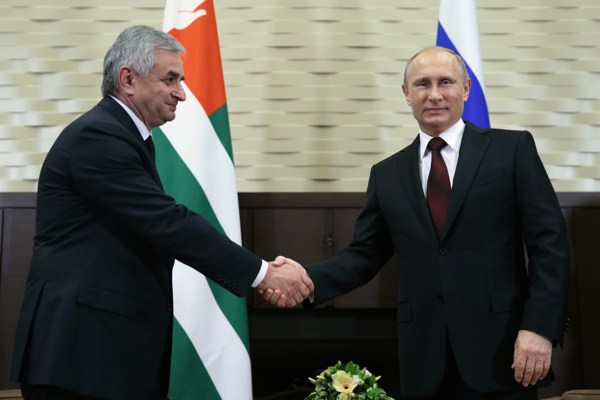Last week, Russian President Vladimir Putin and Raul Khadzhimba, president of the breakaway Georgian region of Abkhazia, signed a pact in Sochi establishing closer ties between Russia and Abkhazia. The agreement gives Russia more control over the region, which Moscow recognizes as an independent country, while extending to Abkhazians a streamlined path to Russian citizenship. It also pledges to modernize Abkhazia’s military in close cooperation with the existing Russian military presence there, and to integrate Abkhazia into the Eurasian Economic Union, Putin’s nascent alternative to the European Union. In combination with Russia’s annexation of Crimea from Ukraine earlier this year, this move is likely to increase Russia’s control over the strategically vital Black Sea.
Abkhazia is one of two regions, along with South Ossetia, that attempted to separate from Georgia in 1992 after the latter declared independence from the Soviet Union. The two regions achieved a degree of autonomy with the help of Russian peacekeepers in the 1990s. In 2008, Georgian forces fired on these peacekeepers, and Russia promptly invaded Georgia; after a brief war, Russia recognized the independence of both Abkhazia and South Ossetia. Observers widely considered this a debacle for Georgia’s pro-Western President Mikheil Saakashvili, who went on to be defeated by Bidzina Ivanishvili’s Georgian Dream coalition in 2012 and has since fled to Brooklyn to avoid prosecution for corruption and human rights abuses.
Given that Georgia’s current government has turned on Saakashvili, and especially in light of the firing of Georgia’s pro-Western Defense Minister Irakli Alasania just weeks ago, the timing of Putin’s latest move is striking. While Georgian Dream remains nominally committed to integration with the EU and NATO and to asserting Georgia’s claim on Abkhazia and South Ossetia, it is not considered especially hawkish on these issues. By staking a stronger claim on Abkhazia now, Putin seems to be daring Tbilisi to escalate tensions.

